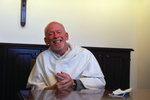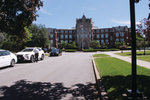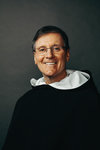As Father Brian Shanley reflects on his 15-year tenure as president of Providence College, he remembers what his parents told him when he was applying to colleges himself.As a senior at Toll Gate …
This item is available in full to subscribers.
We have recently launched a new and improved website. To continue reading, you will need to either log into your subscriber account, or purchase a new subscription.
If you are a current print subscriber, you can set up a free website account by clicking here.
Otherwise, click here to view your options for subscribing.
Please log in to continue |
|



As Father Brian Shanley reflects on his 15-year tenure as president of Providence College, he remembers what his parents told him when he was applying to colleges himself.
As a senior at Toll Gate High School, Shanley was set on going to a prestigious Ivy League institution to become a lawyer. But since he received free tuition for PC because his mother worked there at the time, he followed his parents’ advice to attend the college and save money for graduate school.
“It’s one of those moments in life you never forget, and I said to myself, ‘My parents are actually making sense,’” Shanley said.
Enrolling in the PC’s Honors Program, he found that his parents were right after all.
“I got a great education, a better education than several of my friends that were at the kinds of Ivy League schools I wanted to go to,” he recalled. “And so in the providence of God, I ended up here and I ended up not going to law school.”
Little did Shanley know that years later, he would become a Dominican priest himself and help usher in an era of prestige as president of the once-obscure college.
“My dream has always been for Providence College to be mentioned in the same sentence with all the other great Catholic schools in this country,” Shanley said. “To have a really national profile, to be seen like Notre Dame, Villanova, Georgetown, Boston College, Holy Cross … and I think we’ve become a more national school.”
During Shanley’s time as president – the longest tenure of any in the college’s history – PC’s reputation in both academics and athletics rapidly rose. The school has become far more selective, accepting just under half of those who applied in 2019.
During Shanley’s presidency, the college invested over $100 million in campus improvements, including construction of the Concannon Fitness Center, the Ruane Center for the Humanities, the Science Complex and the Ruane Friar Development Center, as well as renovations of the Slavin Center. Shanley also oversaw the creation of the college’s School of Business in 2008.
The Friars basketball team has also gained a national profile, appearing in the NCAA and Big East tournaments multiple times in the past several years, winning Big East in 2014. The hockey team also won its own NCAA tournament in 2015, which Shanley described as “the single most thrilling moment in his tenure.”
Shanley was prepared to serve another five-year term as president, and the college’s Board of Directors wanted him to stay. However, Father Kenneth Letoile, Provincial of the Dominican Province of St. Joseph and Shanley’s religious superior, decided it was time for a change.
“As I look back I don’t really have any big regrets,” Shanley said in an interview last Thursday. “There are things that I would have liked to have kept the ball moving on. There’s still a lot of work to be done on diversity, equity and inclusion here.”
Connecting the dots
Originally with thoughts of becoming a lawyer, Shanley quickly became interested in academia while majoring in history at PC as an undergraduate.
But when one of the Dominican priests at PC introduced Shanley to the priesthood, he realized that he could be both a priest and a professor. The Dominican religious order of Catholicism is well known for its devotion to teaching, preaching and philosophy.
“What attracted me was the mix in the Dominican life of being a priest but also being a scholar,” Shanley said. “And as I said, I came to the scholar piece first, and then the priesthood piece. I saw it connected because what both vocations involve is communication and speaking with people, and the Dominicans, when I was here, were just unbelievably good preachers. And that’s what we’re supposed to be doing, and preaching and teaching are very much the same sort of thing. You’re communicating with people, you’re trying to connect with people, trying to change their minds and hearts in what you’re doing.”
Shanley said while many priests describe a particular event, or a “burning bush” moment, that convinced them that the clergy was their calling, his experience was a bit more complex.
“As I sifted through the pieces of my life, conversations that I had with certain people, things that I read, stuff that I heard at Mass … I connected the dots and I felt like God was telling me, ‘This is what I want you to do,’” Shanley said. “And I have tried to help people in their lives to put the dots together because God is often very subtle about how he operates.”
Perspective on education
After spending three years teaching philosophy at PC after graduating in 1980, Shanley earned a doctorate from the University of Toronto, as well as additional education at the Catholic University of America and the Dominican House of Studies in Washington D.C. He taught at CUA for 11 years before being asked to apply for the position of president of PC.
As a philosophy professor, Shanley said that his teaching style is focused less on memorizing facts and more on developing critical thinking skills. When he first became the college’s president, he was involved in curriculum review that included focus on active learning rather than lecturing. And when he taught classes, he believed that historical Dominican Friar Thomas Aquinas’ method of teaching the arguments for one view point for a day, another the next day and a third day dedicated to discussing which viewpoint is right. Shanley believes that this is imperative for students in forming their own points of view.
“You know a Catholic institution is supposed to convey a Catholic point of view, but you can’t do that in a vacuum,” Shanley said. “You have to also convey other points of view and learn how to get into a dialogue from the Catholic point of view with other points of view. And that’s what I think we’re trying to do here in Providence College, and the college in 20 years from now, you hope they are going to be doing that as well.”
Shanley also had to oversee a transition to remote learning due to the COVID-19 pandemic this spring. Although he feels that colleges across the country did well in adjusting, nothing is quite like in-person learning.
“Going back to Socrates … that was the form of learning,” Shanley said. “He talked to people. And I think the pandemic has highlighted the value of the residential experience and also all the other extracurricular learning that you have on a college campus.”
Top question on every campus
“In the climate that we’re in right now, race is going to be the No. 1 question on every college campus going forward,” Shanley said. “It’s how we make America a truly just society, and what role our college campus is going to play in that. So, the pandemic will go away. But race is never going to go away.”
In 2016, about 50 students held a sit-in in the president’s office to protest racist incidents on campus. After protesting for 13 hours, Shanley signed an agreement with the students, committing to draft a plan to address student concerns including campus diversity, creation of a diversity committee and diversity curriculum reform.
Steven Maurano, associate vice president of public affairs, government and community relations, said that some of Shanley’s initiatives, including removing the standardized testing requirement for admission and providing more funding for athletics, has helped make PC more equitable. Although some in the community have disagreed with these decisions, Maurano said those who don’t agree respected Shanley’s judgment.
According to Shanley, about 10 percent of students at PC identified as people of color when he became president. Today, the proportion has doubled to about 20 percent – an improvement, but still below the national rate of about 40 percent.
What’s ahead
Father Kenneth R. Sicard will become president of Providence College next month. He has served as the college’s executive vice president during Shanley’s tenure, as graduated from PC as an undergraduate two years before Shanley.
“Father Shanley was a terrific leader and a wonderful mentor to me,” Sicard said. “We’ve worked together for 15 years and I’ve known him for close to 40 years. He’s someone I’ve really, really admired. I feel like he’s led Providence College through its golden years.”
While Shanley comes from an academic background, Sicard has a history in business. Before entering the priesthood, Sicard worked as an accountant for years. He also functioned as something of a chief operating officer for the college while he was executive vice president, according to Maurano.
Despite these differences, Sicard wants to continue Shanley’s commitments to raising the college’s academic profile, increasing on-campus diversity and inclusion and remembering the college’s Dominican Catholic mission. More specifically, Sicard has helped craft the PC200 Strategic Plan, which details plans for the college to improve educational experience, make campus more inclusive and become more nationally visible.
One thing Shanley knows he’ll do during his break is golf. Golfing has been a longtime hobby of his, as well as listening to opera and martial arts, particularly Xing Yi. Shanley said that Xing Yi has helped him maintain both physical and mental health.
“It’s been like a therapy for me,” Shanley said. “Learning a martial art is learning how to use your body in different ways. And I was always attracted to the grace of martial arts.”
Moving to remote learning during the COVID-19 pandemic has made the end of his presidency more difficult than expected, but Shanley is relying on his faith to get through.
“I thought I was going to have time to reflect as I was going out the door instead of dealing with the pandemic,” he said. “And so I’m going to take at least six months off and kind of go back to the discernment game that I played when I was here [as a student] and say to God, ‘What do you want me to do?’”
Comments
No comments on this item Please log in to comment by clicking here